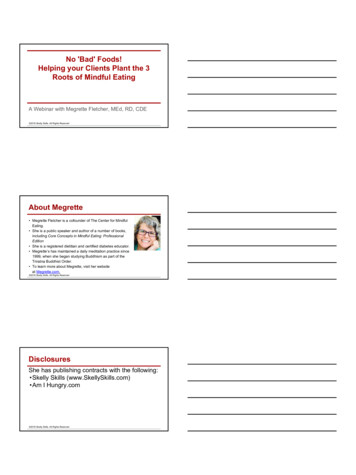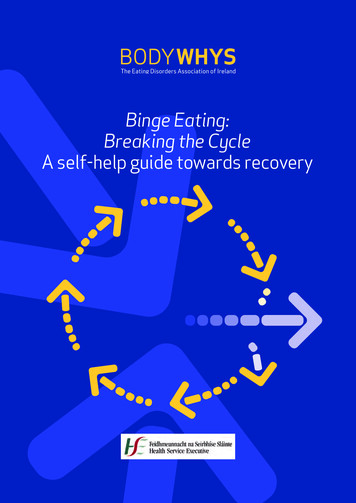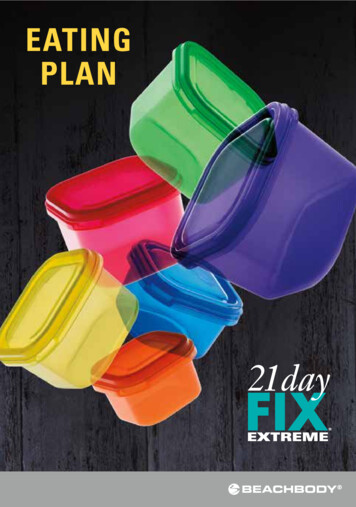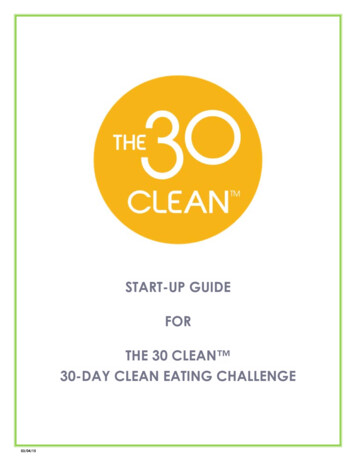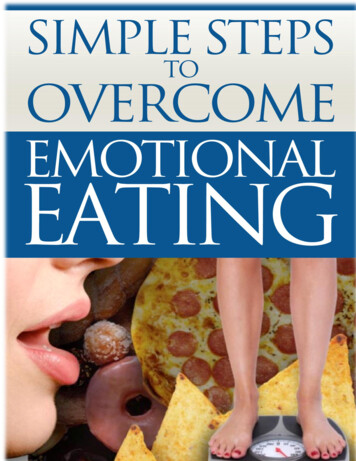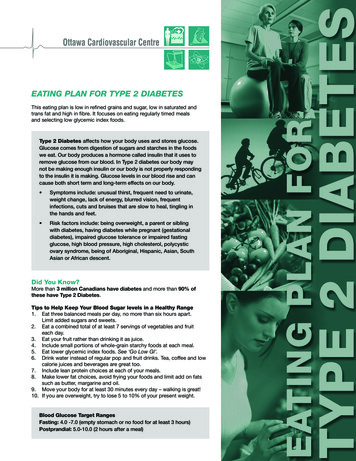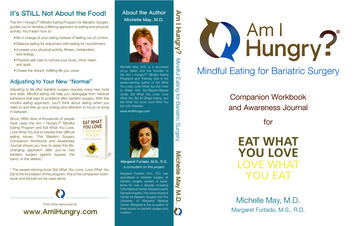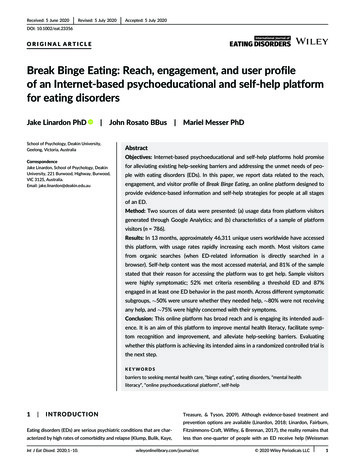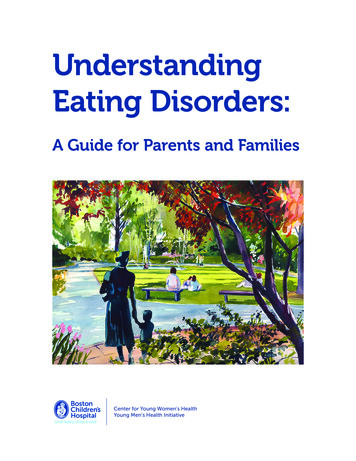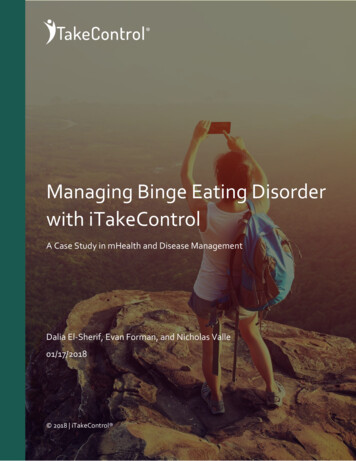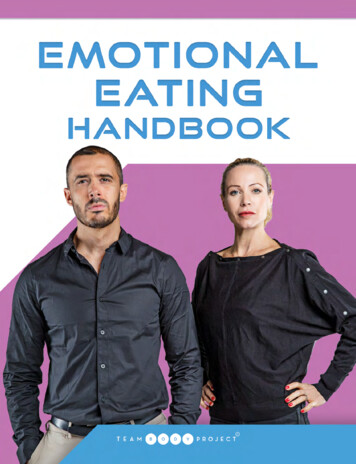
Transcription
CONTENT GUIDEEMOTIONAL EATING1.2.3.Introduction to emotional eating 31.2.“Biology, smiology” 31.3.A separation 41.4.Choosing a workout program (step 2)Conquer emotional eating 62.2.Physical hunger versus emotional appetite62.3.The truth about hunger and weight loss72.4.The five habits72.5.Proactive habit 1 – write down your triggers72.6.Proactive habit 2 – pause 82.7.Proactive habit 3 – control your environment102.8.Proactive habit 4 – create a new habit112.9.Proactive habit 5 – think sustainable122.10Final word 13Healthy food thoughts 14Copyright 2014 Butterfly Publishing.First published in Great Britain in 2018.All rights reserved. No part of this publication may bereproduced, shared or transmitted in any form or byany means without the prior written consent of thecopyright owners.Text copyright Daniel Bartlett and Alexandra Bartlett.Book designed by R & W Media Limited.Edited by Nichola Tyrrell, Jo Lightfoot and L. Staggs.Photography by Lovelight Photography.www. teambodyproject.com2
EMOTIONAL EATINGINTRODUCTION TO EMOTIONAL EATINGWould thunder be half as majestic without lightning to illuminate the night sky with every roar?Would Ginger Rogers float with such impossible elegance without the accomplished hands of FredAstaire to guide her?If they’d never met on a cold and dreary morning in 1950s Liverpool, would Lennon or McCartney havepenned some of the most memorable songs of the 20th century?You see, some things just belong together. Drawn to one another with an irresistible, magnetic force,they are unquestionably better off as a couple.Don’t be fooled, however, into thinking that just because things are drawn together, that they are richerfor finding one another.Things didn’t turn out so well for Bonnie and Clyde, and while Romeo and Juliet may be lauded inposterity, it’s fair to say that were their chance encounter avoided, they would probably have lived longand happy lives instead of an ever so romantic but ultimately unsatisfying ‘his’ and ‘hers’ ending.Which leads me onto the irrepressible relationship between emotions and large amounts of readilyavailable, highly digestible, completely unsuitable food.Emotions are wild, ravenous creatures that don’t respond to reason or logic because emotions are hungry.“Biology, smiology”We have two good feet for walking. Two eyes for looking at things. A couple of ever so useful hands forpicking up the things that we see. We’ve been given two ears for hearing things and a mouth for tellingpeople what we’ve heard.That all makes sense.What doesn’t make quite as much sense is why an irrepressible sensor runs directly from our tummyto our brain, rewarding processed food consumption with a super-sized portion of ‘feel good for about10 minutes’.Why does junk food release serotonin and dopamine? (Hormones that make us feel temporarily better.)A doctor of ancestral eating patterns will no doubt enlighten me, so I’ll pre-empt below:“When there was a food shortage in our ‘hunter gatherer’ days, it was very important we ate lots of foodto survive. Food was in short supply, therefore our brains would reward us for eating high calorie, highenergy foods.”I thus retort: “Blah, blah blah-de-blah ”3
EMOTIONAL EATINGA dollop of happy hormones to reward us for tucking into a raw mammoth thigh in such plightedcircumstances seems somewhat surplus to requirements when we’re already preventing certain death!Be that as it may, there is no escaping the fact that eating high calorie, high energy foods releases feelgood hormones, and when whoever created the human body created the human body, they didn’t factorin Häagen-Dazs competing with Ben & Jerry’s to create the most deliciously flavoured ice cream theworld has ever seen.Which brings me onto the emotion/eating relationship.It is destructive, unhealthy and damaging. If Emotions was Eating’s spouse, Eating would terminate themarriage, citing unreasonable behaviour from Emotions as indisputable ground for decree absolute.A separationHealth and contentment are two entirely distinct battles.Statement 1: Becoming healthy will not necessarily equate to you feeling happier. Although it willprobably help.Statement 2: Becoming happier will not necessarily equate to healthy behaviours. Although it willprobably help.I’ve used the term ‘happy’ to embarrassingly oversimplify and incompetently describe the concept of anabsence of the incalculable variety of negative emotional issues the human psyche can experience.In this context, I’m pretty convinced perpetual ‘happiness’ is an impossibility.I like to compare an emotional life to painting the Forth of Firth Bridge, (a bridge in Scotland, famous foralways being painted, such is its vast size). Just when you think you’ve finished and stand back to inspectthe wonderful job you’ve done, you notice that an old part of the bridge is starting to show signs of wearand tear and you’re back to work again.Since the job of emotional management is an ongoing one, linking emotions with eating is a monstrouslybad idea.Many experts correctly ascertain that if you solve your emotional problems, you will stop emotionaleating. This is, of course, almost entirely true.The problem being that nobody, ever, has solved the puzzle of fixing emotions.There is another word for emotional struggle and strife.That word is life.So, if you’re willing to accept that you’re pretty unlikely to solve the mystery of life anytime soon, itshouldn’t take a great leap of faith to accept that you’ll need to takea different strategy to overcome emotional eating.4
EMOTIONAL EATINGWhen you feel bad. Don’t eat. Ask yourself why you feel bad. Then feel bad.When you feel happy. Don’t eat. Ask yourself what made you happy. Then feel happy.When you feel scared. Don’t eat. Ask yourself why you are afraid. Then feel scared.Emotions know the square root of nothing about food. They have VERY important messages to deliverbut they haven’t got a single clue when it comes to cuisine.Our emotional eating handbook provides you with five very simple habits to implement and beatemotional eating.Will achieving your health goals reconcile all of the emotional struggles you have? No, it won’t, but youwill feel more resilient and able to confront life’s challenges.5
EMOTIONAL EATINGCONQUER EMOTIONAL EATINGEmotional eating has as much complexity as there are people in the world. Everybody has an entirelydifferent experience.On the other hand it is incredibly simple:1.2.3.You eat impulsively and without thinking.You eat for reasons beyond the need for food.You hold false beliefs about food that prevent you from reaching your goals.If we can remove the above three factors from the equation, we are left with only two times to eat:1.When we are actually hungry.2.When we have decided we are going to eat (including ‘unhealthy’ foodsand celebrations).With the five-step emotional eating plan we will give you five simple habits that, when implemented, willallow you to enjoy all types of food free from guilt and in quantities that are in line with your goals.Physical hunger versus emotional appetiteIt is important to separate the physiological need for food from the emotional appetite for it.One is essential to survival and the other is a surefire way to ruin your goals!Hunger is the physiological call to foodAppetite is the emotional call to foodPhysical hunger builds up graduallyEmotional appetite comes on suddenlyPhysical hunger is patientEmotional appetite demands immediateattentionPhysical hunger can be satisfiedEmotional appetite is insatiableAfter eating for physical hungeryou feel satisfiedAfter eating for emotional appetiteyou feel guiltyPhysical hunger appears two to threehours after previous mealEmotional appetite can appear at any time6
EMOTIONAL EATINGThe truth about hunger and weight lossIf you want to lose weight you will feel physiologically hungry and you won’t always be able to satisfyit. The process of ‘not having enough calories’ is what will cause your body to raid the stores of fat torelease them for energy.If you want to make progress, you’ll need to feel hungry from time to time. The difference withphysiological hunger is after 30 minutes your body will free up stored fat for energy use and your hungerwill pass.Emotional appetite does not follow the same rules.You are experiencing emotional appetite and driven to emotional eating any time you are not eatingbased on hunger signals. Emotional eating is never useful and this handbook will help you remove thishabit and develop a healthy relationship with all foods.The five habitsAction is the driver of all change.We could write and talk about emotional eating all day, but only action creates change.The emotional eating handbook has five proactive habits you can implement in order to create success.Proactive habit 1 – write down your triggersActively try and highlight the moments you feel triggered to emotional eating. Is it boredom?Is it social events?Disappointment?Success?Fear?Anxiety?The smell of food?Relationships?Locations?When it comes to behaviour, awareness is nine-tenths of the law. If you can successfully identify thetriggers and moments that draw you towards emotional eating, you can start the process of overridingthem and taking control of your decisions.Your habit is to identify your triggers as they happen and create awareness.7
EMOTIONAL EATINGCase study – Susan, 43larly and eatingeater and despite exercising reguSusan was a lifetime emotionalidered to bealways hijacked by what she consa healthy diet, her results wereuncontrollable binge eating.w but I asked her totional eating. She thought she kneI asked her what caused the emoe anyway.write down what those things werhappy to talk to mesee me and I asked her if she wasThe next week, she came back toabout what she had learned.ents in her life weremany different events and momShe was visibly shocked at howss or anger to behad expected emotions like streassociated with food. While shedom and evenboreringing, her mum texting her,triggers, the television, the phonegering her.walking past the bakers were trigfoodmoments she had been hangingHer entire life was littered withon to ‘cope’ with.In her words:d by events, II was hungry or just being triggere“When I actually asked myself ifss was the keyto avoid emotional eating. Awarenewas surprised at how easy it wasmoment for me.”ng and hurdles were stilland while it wasn’t all plain sailiThis was a revelation to Susan,her reach her goals.ards we were finally able to helpto be leaped, from this point onwProactive habit 2 – pauseThe most valuable gift we can learn in mastery of self is the ability to pause and ‘take a moment’ beforeengaging in behaviour.A profound pause that creates space for rationale.Of all the habits we can create in defence of emotional eating this is the greatest of all.While pausing for a single minute may seem such an insignificant amount of time, this moment creates avast ocean between your emotions and your ultimate behaviour.In the context of emotional eating that is groundbreaking.In the newly formed ocean between you and your action, your logical mind can rise to the surface andenter the debate. (That is not to say your logical mind will always win the argument, but at least it willenter the conversation.)8
EMOTIONAL EATINGWithin this minute, a number of questions can arise.“Do I really want that piece of cake? Maybe a handful of nuts is better?”“Am I actually hungry? Maybe I’m bored?”“How am I going to feel afterwards? Is it worth it?”Work at developing this habit into your daily routine in the same way you work at exercising every day.Here is the habit:1. Whenever you are going to eat, set your phone/watch timer to 60 seconds.2. In that 60 seconds, bring rationale to your decision. Ask yourself questions about your hunger: Am I hungry or thirsty?Am I hungry or am I trying to change the way I feel?Are there healthier options I could eat instead?What other things could I do instead?How does this decision align with my goals?Is this ‘junk food’ part of my plan or is it driven by emotions.What am I actually looking to achieve?Am I bored? Am I angry? Am I frustrated?3. At the end of the 60 seconds, make the decision and take action accordingly.4. If, five minutes later, you get driven to emotional eating again, repeat the process. Before ANYfood passes your mouth; your behaviour is to pause for 60 seconds.That is the proactive emotional eating habit you are introducing to your life.Exercise PEat plenty of vegetables PDrink water PPause for a minute before eatingPCreating habits is central to success. Take every habit you build seriously if you believe that habit isimportant to your long-term success.9
EMOTIONAL EATINGCase study – Michael, 59n what his triggersWhen I asked him to write dowMichael was a compulsive eater., even a week later.were he struggled to identify themI’m doing it or enjoy itexperience. I don’t even know why“I almost go into an out of bodyI do that for?”.it and then think “oh no, what didmost of the time. I just kinda dotrigger is, just pausek on. Rather than ask what theI gave him a specific habit to wortever it is you are about to eat.before you are about to eat whaal eating habit. He hadael needed to break his emotionThis became the central habit Michtime to bring hishimgave’sing‘pauting the habit ofa very clear set of goals and creation.long-term goals to the conversaI have worked with., but not that unique amongst menMichael is a slightly unique casective at aligning goalstify triggers but can be very effeThey often find it harder to idene.with behaviours within a structurProactive habit 3 – control your environmentIf the foods you desire when confronting emotional eating are not available, then you can’t have them. Ifhealthier foods and/or water are available you will have them instead.This strategy really is that simple.There is a two-step approach to controlling your environment.1. Remove all temptations Clear your cupboards of tempting foods, treats and snacks that you know you would betempted by if available.(We know this can be hard with small children, but not impossible.) Remove temptations from your car and anywhere else you may go. Remove temptations from work as much as possible. (We understand this can behard too.) Take minimum cash to places like the cinema or coffee shops, so you can only buy whatyou planned for and nothing more.2. Have suitable replacements available at all times Make a list of healthy snacks you can enjoy (replacement snacksare a last resort). Have them available. Have a bottle of water available as a first solution all the time.Note: This habit should be seen as a temporary habit rather than a permanent one.10
EMOTIONAL EATINGProactive habit 4 – create a new habitThere is a saying in behaviour change circles.If an inanimate object can do it, it’s not a behaviour. A chair can ‘not eat’ therefore, ‘not eating’ is nota behaviour.If we are going to stop one behaviour, in this instance emotional eating, we need to replace it withanother positive one.What positive habits can you replace your emotional eating with? Drinking a glass of water?Taking five minutes of meditation?Walking 500 steps?Reading a book for five minutes?Doing 10 push ups?Find a positive habit that you can enforce to replace your emotional eating habit and make that a habit.If you are an emotional eater you must take this as seriously as you take your daily workout foryour goals.Note: As a last resort you can have a healthy snack as your replacement behaviour but this is a short-termsolution. We are trying to avoid eating for emotions, so using food is not ideal.Case study – Sarah, 64Sarah was a doer. She pressed play every day without fail. She hadexcellent ‘active’ discipline and yet struggled with ‘passive’ discipline.I explained that doers needed things to do.“It was like a revelation to me. To treat drinking water or going fora walk as an active behaviour in the same way that exercise hadbecome part of my routine. This simple concept changed my life. Notonly did I break my emotional eating habit, I broke my ski sit recordby 60 seconds.”P.S. In case you hadn’t guessed Sarah had decided to do the ski sit whenever she was caught up inemotional appetite.11
EMOTIONAL EATINGProactive habit 5 – think sustainableFeeling restricted and deprived of foods is not positive for long-term goals. Many people are frightenedto eat foods that have always been associated with comfort eating, but it is important to change yourrelationship with food if you want long-term success.Provided you have a predominantly healthy diet, there will be no considerable difference to your dietbetween choosing a banana or a small chocolate bar or cookie as a snack.Having reasonably sized snacks that you enjoy scheduled into your plan – those you have previouslyovereaten and felt guilty eating in periods of emotional eating – will change your relationships withthese foods to a positive and enjoyable one.No food is good or bad. It is just food.You can have a balanced and enjoyable relationship with all types of food, provided you either:A. Have them scheduled into a nutrition plan that is based around your goals.B.Eat when you are physiologically hungry.C.Do not eat when you are emotionally hungry.Case study – Ali, 37great week ofhad enjoyed a reallyAlidanndouareFriday evening camexercising.healthy eating andos.w a big bag of Dorite cupboards and sathinklooaoktoSheI opened the bag,work in the week.rdhaymofalltreat forole bag. I felt guilty“I felt I deserved ad up eating the whdeentbu,fewaveintending only to haof my hard work.”wouldt like I’d ruined allfeldansrdone bag of Doritoswaterafand explained thatyturn andatxtnonedeanthgoAliitI spoke withs and to letultreslleraovrhect onhave negligible impa.ent into a disasterommtanificigninsbuilt into thesnacks and treatsgvinhaofencrtae impour relationship withI then explained thimately change youltdannplae,arepweek so you can prfood.iday night with aof Doritos every Fronrtipoathanvehauldcoplishments. RatherWe agreed that Alicelebrate her accomdthanwiipjoyshen,ionaxatrelpositive relglass of wine toos and developed aritDorheedjoyenfeel guilty, Alid.been a comfort foowhat had previouslyd forwards tothis habit and lookeedainreteshAlirked withFor as long as I wog-term goals.ile achieving her lonwhattrelyher week12
EMOTIONAL EATINGFinal wordThese habits are not ideas.These habits are not concepts.These habits are not words for you to read and agree with.They are habits – like exercise or eating vegetables.THE FIVE HABITSHabit 1 – Write down your triggersHabit 2 – PauseHabit 3 – Control your environmentHabit 4 – Create a new habitHabit 5 – Think sustainable13
HEALTHY FOOD THOUGHTSHEALTHY FOOD THOUGHTSTo develop a healthy relationship with foods, rather than an emotional one, it is helpful to have a list ofhealthy thoughts around food.HEALTHY FOOD THOUGHTSPrint this out and place it on your fridge or somewhere else you look every day.1.Food is just food.Food is not anything except food. It is not the reason for my problems, nor is it the solutionto them. It is just food.2.Eating for social reasons is great.I eat healthily for many reasons. This does not mean enjoying foods of all types with friendsand family is not a good thing, provided it is part of my plan and in line with my goals.3.If I want results I can’t just ‘eat what I want’.Everything worth having in life requires some form of compromise. A healthy body requiresme to consider the foods I eat. A healthy body and life is more valuable to me than food.4.Habits are the driving force behind my ultimate results.It is the habits I implement on a daily basis that will create the healthy body I want tohave.5.If I make a mistake it doesn’t make too much long-term difference.I am not perfect. Sometimes I make a mistake and don’t stay with my plan. That is fine aslong as I let it go and move on.6.Food doesn’t solve my stress or make things better.I understand that food has never solved any of the problems in my life, but I do not blameit for any of the problems I have either. It is just food.7.Healthy eating doesn’t mean perfect eating.I can eat between 70% and 90% healthy foods and still have a healthy body. No food is bador good. It is just food.8.Eating less or more of something is my choice.I do not ‘have’ to eat fewer calories or lose weight. I choose to eat fewer calories andmore vegetables because a healthy body is important to me.9.Food helps me achieve my goals.Healthy nutrition makes me feel better, perform better and achieve all my goals in lifebetter.10.My body is valuable to me. It deserves good fuel.I value my body as the most valuable asset I will ever own. I will respect it and give itthe fuel it deserves.14
egularly and eating ed to be ollable binge eating. I asked her what caused the emotional eating. She thought she knew but I asked her to . y to talk to me about what she had learned. e ess or anger to be edom and even ing her. ed with moments she had been hanging food on to ‘cope’ with
